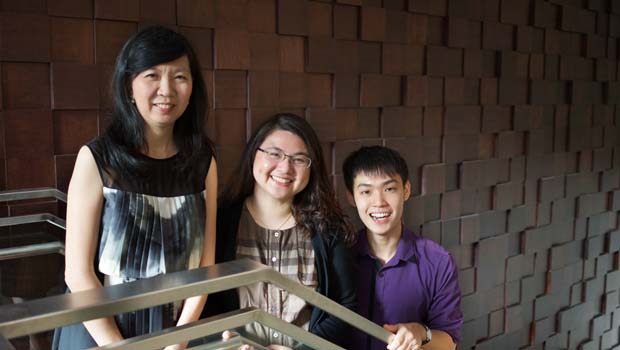
Photo: Dr Sophia Chew (left) and her mentees, Dr Roderica Ng and Gerald Lim
“I am immensely proud of their achievements. I started guiding both Gerald and Roderica when they were in their first year of medical school, and it feels great to be a part of their journey,” said Dr Chew.
Under her mentorship, both Roderica and Gerald received helpful guidance in preparing manuscripts, presenting posters, and in grant and publication writing – experiences that most medical students will not have exposure to.
“Over the years, I have attended 12 conferences locally and overseas, and I’ve been named as an author of eight scientific manuscripts, in which Dr Chew is the senior author,” added Roderica.
"I try to give the students realistic goals and ownership of the paper, something that really encourages them."
Dr Chew’s interest is in postoperative acute kidney injury (AKI), a serious complication that can occur after cardiac surgery. As clinical factors alone have failed to accurately predict the incidence of AKI, she turns to research for more insights.
Her work in a collaborative project between SGH and NUH has resulted in the largest cardiac surgical anaesthesia database in Singapore, with the data of over 3,000 patients.
“Medical students like Gerald have not stepped into a ward or an operating theatre before, but working with this database allows them to understand the issues involved and gain knowledge far beyond what their peers, and even seniors, may have,” said Dr Chew.
Gerald added, “I didn’t even know what AKI was. I’ve learnt so much in the process. I’ve now attended two conferences and in the process of writing up my first manuscript.”
“It helps that medical students like me feel included in the research team. There is a sense that we’re all equals.”
At the moment, Dr Chew has 20 mentees under her wing. Her approach is to start by helping her mentees develop “the research question”.
It starts with Dr Chew suggesting a question, which prompts the mentee to conduct a literature review, before determining the hypothesis and the methodology to be used. Then the relevant data is harvested from the database to be analysed.
“This process can lead to a paper in as soon as half a year. I try to give the students realistic goals and ownership of the paper, something that really encourages them,” said Dr Chew.
“It has been very rewarding to see the students develop from rocks into diamonds.”
----
Surgery ACP research mentorship programme
This programme aims to systemically and effectively pair clinicians and/or scientists as mentors to medical students from YLLSoM and Duke-NUS. It provides a 6-month to 1-year research opportunity for medical students to work closely with a faculty member to carry out research project according to their research interest. For more information, visit https://www.academic-medicine.edu.sg/SurgeryACP/research













 Get it on Google Play
Get it on Google Play